In today’s competitive digital landscape, Enterprise SEO has become a critical strategy for large-scale organizations aiming to enhance their online visibility. At OctopusWriters, we understand the complexities of optimizing websites with thousands of pages and the challenges that come with managing large-scale SEO projects. Our expertise lies in crafting tailored SEO solutions that not only boost search engine rankings but also drive meaningful traffic and conversions. With a data-driven approach and cutting-edge techniques, OctopusWriters ensures that your business stands out in the crowded digital space.
What Is Enterprise SEO?
Enterprise SEO involves enhancing search engine rankings for large-scale organizations. This approach typically focuses on strategies like scaling content production, continuously managing technical SEO, and implementing automation.
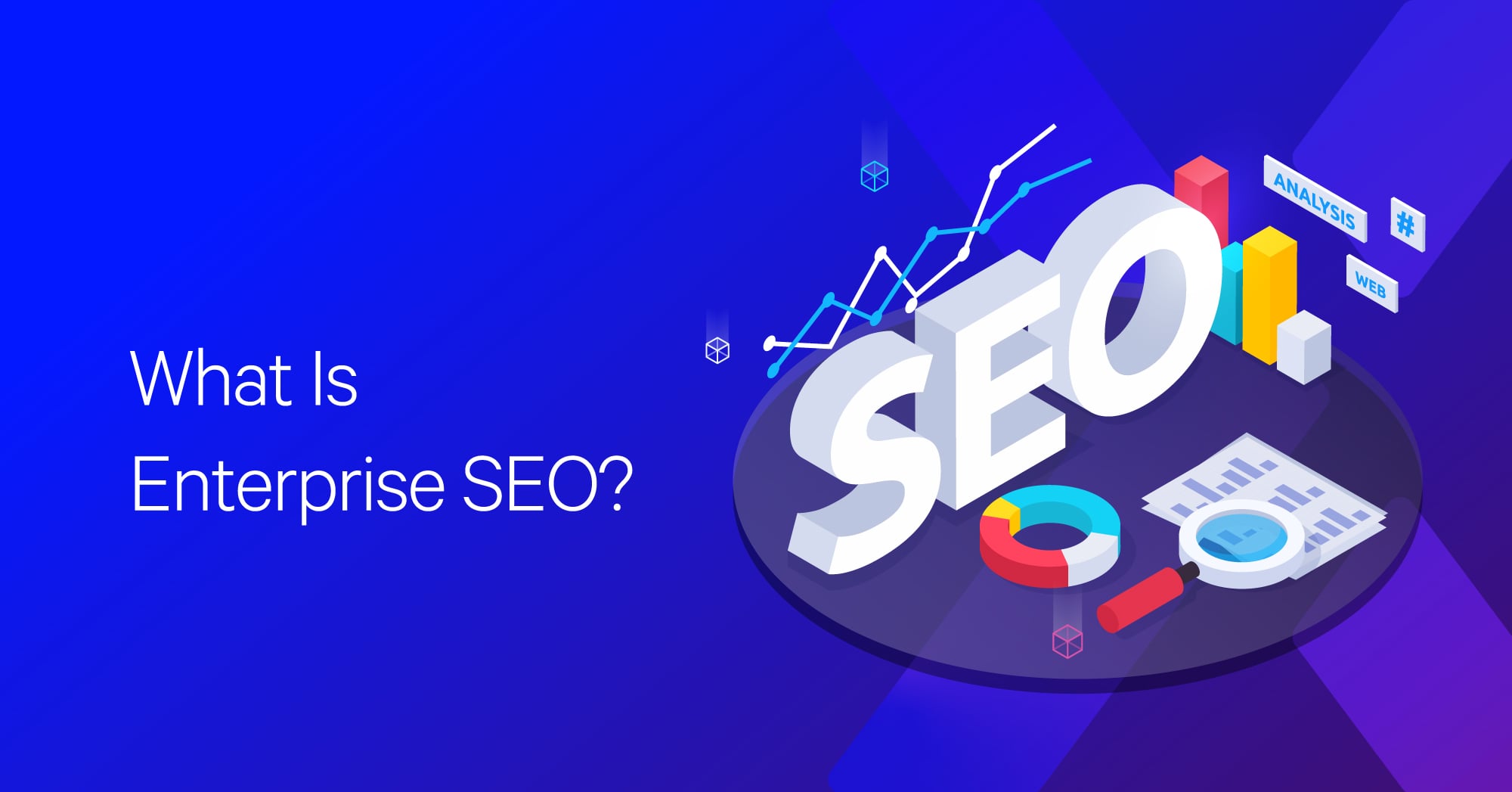
What Is Enterprise SEO?
Some examples of sites that require enterprise-level SEO include major ecommerce platforms with over 10,000 pages, Fortune 500 companies, businesses with multiple branches, or enterprises that operate several websites. Standard SEO tactics may not be as effective for these types of large websites, and many traditional SEO best practices need to be modified to suit the complexities of a site with millions of pages.
How is Enterprise SEO Different Than “Normal” SEO?
Here are some key distinctions between Enterprise SEO and traditional SEO:
Scaling
The most significant difference between optimizing for enterprise SEO and smaller sites is scale. Optimizing a few pages on a small site is manageable, but when a site contains thousands—or even millions—of pages, everything needs to be scaled up to make a real impact on organic traffic.
Take internal linking, for example. For a small site, adding a few internal links can noticeably improve rankings. But for a large enterprise website, like Amazon with millions of pages, a few internal links won’t be sufficient. To effectively use internal linking on such a site, it must be scaled—perhaps through an SEO-friendly site structure that auto-generates internal links or by implementing a script to link key pages automatically. Manually handling internal links on such a massive site would be impractical.
Similarly, content production must scale with enterprise SEO. For large ecommerce sites, this means creating unique content for thousands of product and category pages. For content-driven websites, scaling content could involve assembling a full editorial team to regularly publish optimized posts. In some cases, businesses may even need to establish an entire department dedicated to content marketing to handle the sheer volume of content required to boost their rankings.
Different SEO Tools
Enterprise websites also require advanced SEO tools, or at least upgraded versions of standard tools, to handle the vast data and technical needs. There are dedicated platforms tailored to enterprise-level SEO, but many standard tools also offer enterprise plans to support large sites.

Different SEO Tools
Team Buy-In
One of the challenges in enterprise SEO is getting buy-in from various departments to implement SEO changes. Large websites often involve multiple teams—such as development, design, and SEO—each working on different parts of the site. For example, fixing multiple H1 tags on a page might seem like a simple task, but for an enterprise site, it could require approval from different stakeholders, making the process lengthy and complicated.
To ensure SEO recommendations are implemented, it’s important to present the benefits in a way that appeals to each department. For example, if you want to flatten the site’s architecture for SEO purposes, you can also highlight how it could reduce server strain and make site management easier. This approach increases the likelihood of gaining support for SEO changes.
Schema Markup
Schema markup is another crucial component of enterprise SEO, particularly for large ecommerce sites or those with extensive databases. Structured data helps search engines understand and index content more effectively, improving search visibility and enabling rich results.
More Pages
Enterprise sites often have hundreds of thousands—or even millions—of pages. While this can lead to more rankings if the content is unique and high quality, it can also introduce technical SEO challenges, such as duplicate content, which needs to be addressed to maintain site performance.
Keyword Research and Selection
Because enterprise sites typically have high domain authority, they can target more competitive keywords. For example, a site like Booking.com can rank for highly competitive keywords due to its vast backlink profile, even with limited content marketing.
Unique Backlink Opportunities
Enterprise websites also have unique opportunities for building backlinks at scale. One of the most common is unlinked brand mentions—where a brand is mentioned online but not linked. These mentions can be turned into valuable backlinks through outreach.
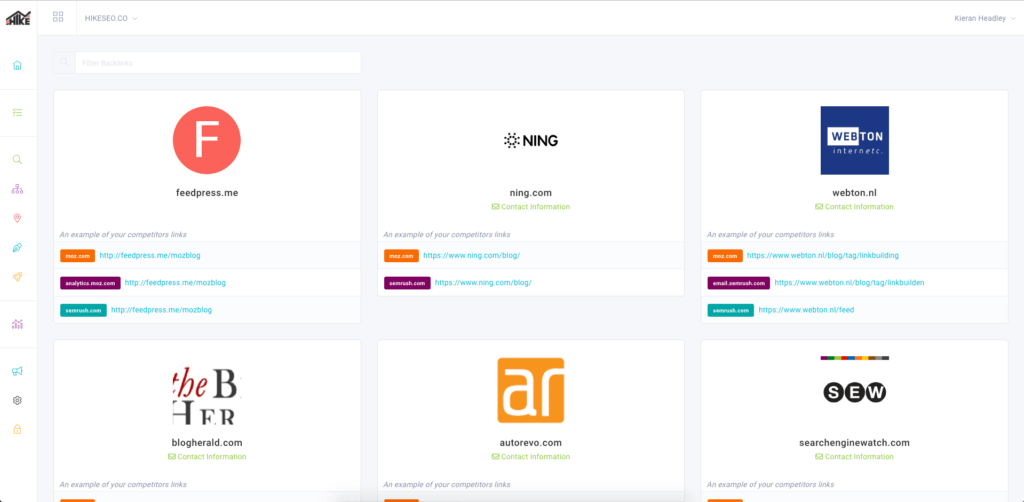
Unique Backlink Opportunities
Marketing Teams
Unlike smaller businesses, which often have a single marketing team covering various channels, enterprise companies tend to have specialized teams for different aspects of marketing, including SEO, content, social media, and development. While this structure can be efficient, it also means that collaboration between departments is crucial for enterprise SEO efforts to be successful.
If these teams don’t work together, the implementation of SEO strategies can be delayed, sometimes taking months rather than weeks. However, when teams collaborate effectively, it enables a faster and more efficient SEO process.
Why should I invest in enterprise SEO solutions?
Investing in Enterprise SEO is essential if you want to keep your business on an upward growth trajectory, safeguard your search rankings, and maintain a strong brand reputation. If you’re unsure about committing to Enterprise SEO, here are three compelling reasons to take the plunge:
- Traditional SEO isn’t enough
You might think, “Why not stick with traditional SEO?” The truth is, it won’t be sufficient for enterprise-level needs. While Enterprise SEO shares some techniques with traditional SEO, the approach is fundamentally different. Traditional SEO often focuses on long-tail keywords (phrases with three or more words) to help smaller businesses attract targeted traffic. In contrast, Enterprise SEO is designed to compete for high-value, short-tail keywords (1-2 words) that tend to be much more competitive. Traditional SEO simply doesn’t have the scalability to keep pace with the optimization demands of a large enterprise, whereas Enterprise SEO provides a more robust strategy to optimize numerous pages and tackle advanced technical challenges. - Fierce competition requires advanced strategies
As an enterprise, you are up against numerous competitors in your market. Relying on traditional SEO methods won’t be enough to stay ahead. With Enterprise SEO, you can enhance your search engine efforts to maintain and improve your rankings, giving you the tools necessary to surpass your competitors. The advanced tactics of Enterprise SEO are specifically designed to manage the competition at this scale. - Scaling your marketing efforts
A key reason to invest in Enterprise SEO is the ability to scale your marketing efforts. Traditional SEO is often designed with small-to-midsize businesses (SMBs) in mind, but Enterprise SEO offers a more extensive approach to support large corporations. With Enterprise SEO, your marketing strategy is tailored to grow alongside your business, from optimizing for a broader range of keywords to increasing your content output, ensuring that your SEO keeps up with your expanding online presence.
How to Outsource Your Enterprise SEO Strategy
Outsourcing your Enterprise SEO can be a powerful way to tap into specialized expertise. Follow these key steps to create a successful collaboration:
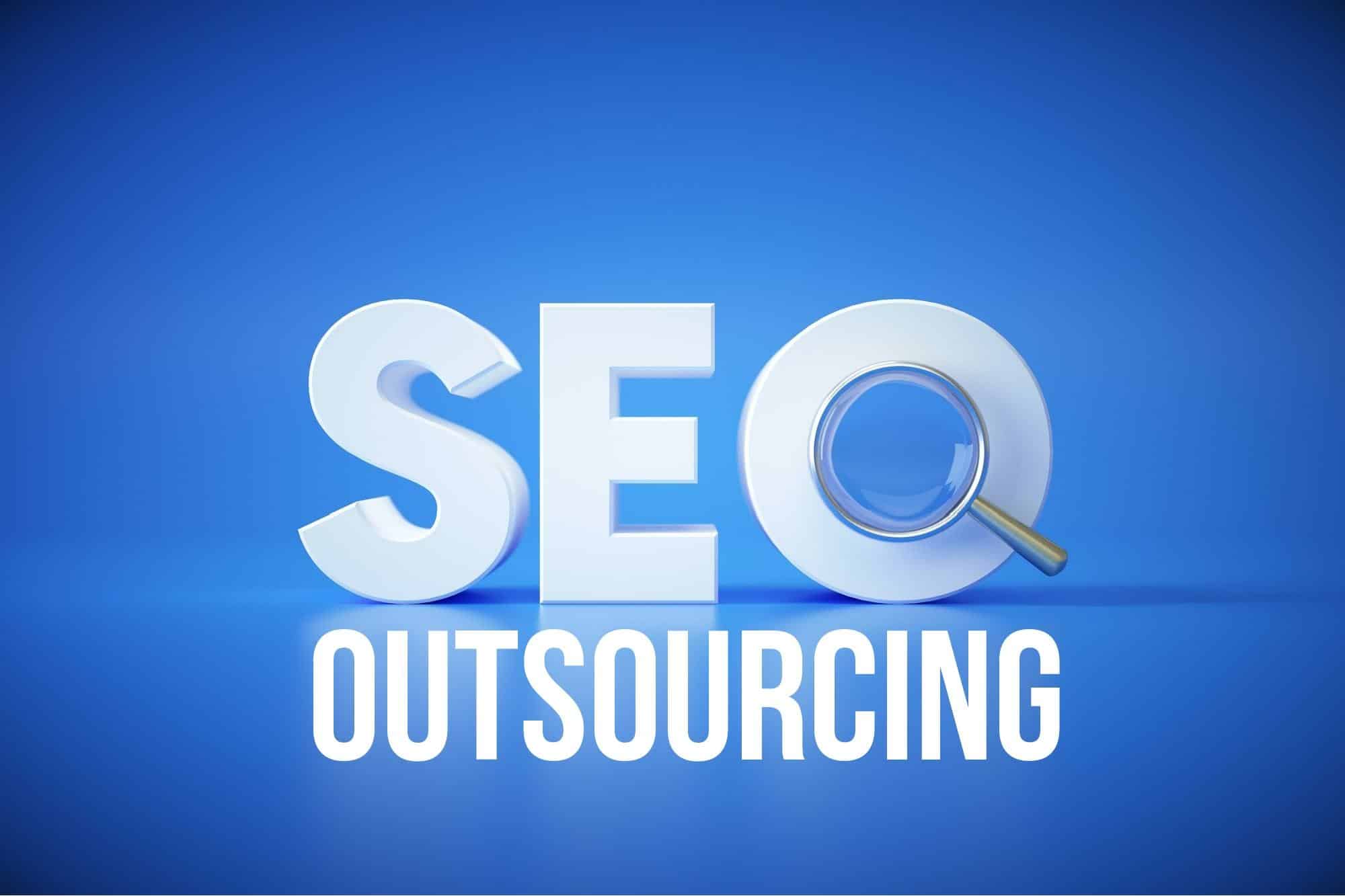
How to Outsource Your Enterprise SEO Strategy
- Evaluate Your Requirements: Start by assessing your current SEO capabilities to pinpoint where you need additional support. Enterprise SEO is distinct from traditional SEO in terms of scale, the tools required, team engagement, and the unique challenges it presents.
- Define Your Objectives: Clearly outline your SEO goals and focus on leveraging the strengths of your site, such as strong domain authority, to compete for highly competitive keywords.
- Select the Right Partner: Look for agencies or consultants with proven experience in Enterprise SEO. They should have strategic processes, access to advanced tools, and be a cultural fit for your organization. Don’t forget to ask for case studies and client testimonials.
- Set Communication Guidelines: Establish clear communication protocols and a regular reporting schedule. Make sure your partner understands how your organization is structured to streamline collaboration.
- Outline the Scope of Work: Create a comprehensive project plan that includes specific deliverables, timelines, and clearly defined roles. Consider opportunities unique to Enterprise SEO when structuring this plan.
- Set Benchmarks and Performance Metrics: Identify your current SEO performance levels and establish benchmarks to track progress and return on investment (ROI).
- Integrate with Internal Teams: Ensure smooth coordination between your internal teams and the external SEO partner to foster collaboration and eliminate operational silos.
- Define KPIs and Set Expectations: Make sure both parties are aligned on success metrics by setting clear, measurable key performance indicators (KPIs) that reflect your SEO objectives.
- Think Long-Term: Approach the relationship as a long-term partnership, with room for growth, flexibility, and ongoing evolution as your business and SEO needs develop.
- Monitor, Optimize, and Scale: Regularly review performance, make data-driven optimizations, and scale successful initiatives for maximum impact.
Outsourcing Enterprise SEO demands a partner who understands the complex challenges and potential opportunities of managing large-scale websites. By setting clear expectations, keeping open lines of communication, and continually refining your approach, you can successfully reach your objectives.
Benefits of SEO for Enterprise Companies
There are several compelling reasons why enterprise companies should prioritize SEO:
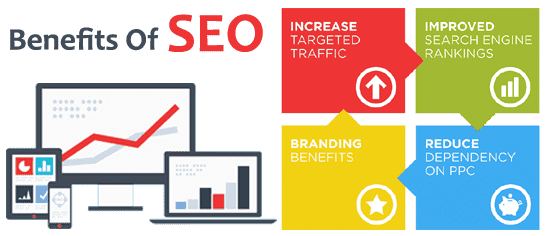
Benefits of SEO for Enterprise Companies
- Building Credibility: Each interaction with potential customers allows your brand to establish itself as the authoritative and leading choice in your industry. This strengthens brand perception and makes your product or service the clear option for consumers.
- Driving Growth: SEO enhances your visibility and boosts brand recognition, helping to attract more prospects and increasing awareness among your target audience.
- Boosting Revenue: Every customer interaction presents an opportunity for conversions and sales, leading to higher customer lifetime value while lowering the costs of customer acquisition.
- Complementing Other Marketing Channels: SEO also supports your broader marketing strategy. For example, you can use paid advertising to retarget visitors based on the specific content they viewed on your site, maximizing the impact of your efforts.
Enterprise Content Marketing Strategy & Tactics
Achieving success in content marketing requires considerable effort. Below are key actions you can take to enhance your enterprise content marketing strategy.
Create new content
There are various forms of content you can produce, but with limited resources, it’s often best to begin with informational content and videos due to their high return on investment (ROI). Once you have more resources, you can expand into creating virtual events, courses, e-books, case studies, white papers, podcasts, and even print publications like magazines or books.

Create new content
For enterprise companies, the sales cycle is generally longer. Many businesses are tempted to bypass top-of-the-funnel content and focus solely on bottom-of-the-funnel traffic that leads to conversions. However, this approach can limit their sales pipeline and give competitors the chance to establish themselves as industry leaders.
While it’s logical to start with content aimed at conversions, it’s essential to eventually invest in top-of-the-funnel content to widen your reach and nurture long-term opportunities.
Improve existing content
Enhancing your existing content can result in quick and impactful improvements. Here are a few strategies to consider:
Identify content with decreasing traffic
Use the “Traffic: Declined” filter in Site Explorer’s Top Pages report and set the timeframe to the past 6 months or a year. Review the pages that have experienced a drop in traffic and focus on improving the ones that are crucial to your goals and have potential for enhancement.
Target low-hanging opportunities
One method to prioritize content updates is to identify pages that rank between positions 4-15 for their primary keyword. These pages can often be optimized to achieve better rankings and generate more traffic with minimal effort. Use Google Search Console or the Organic Keywords report in Site Explorer to locate these opportunities.
Optimize for featured snippets
For informational content, winning a featured snippet can help you jump to the top of search engine results pages (SERPs).

Optimize for featured snippets
To find quick wins for featured snippets:
- Open Ahrefs’ Site Explorer
- Input your domain
- Access the Organic Keywords report
- Filter for keywords ranking in positions #1–5
- Filter for keywords triggering featured snippets where your site doesn’t appear
- Identify opportunities where your content is missing an answer, and then add that information.
Translate successful content
Most enterprise companies operate across multiple countries and languages, requiring their enterprise SEO teams to tackle international SEO. If you have content performing well in one language, chances are it will also perform well in other languages. The key is to translate this high-performing content for those additional markets.
At Ahrefs, we’ve seen positive results with this approach, even though we’ve allocated minimal resources to it. It’s an area where we anticipate significant growth as we begin to focus more on expanding these efforts.
Create branded content, sometimes
It’s common to come across content that is too focused on the brand, product, or even just keywords. Often, you’ll find requests to rank for terms on pages that don’t align with user intent. For instance, people might attempt to “sprinkle in keywords” on product pages to target informational queries.

Create branded content, sometimes
To avoid this, you can utilize the “Identify intents” feature in Keywords Explorer. This tool helps you understand the primary search intent behind each term, as well as the percentage of traffic going to each result. For example, a product page targeting “enterprise content management” is unlikely to rank effectively, as most of the top-ranking results are focused on informational intent rather than product-focused content. For a more effective Enterprise SEO strategy, it’s crucial to align the content with the searcher’s intent.
Syndicate content
Content syndication refers to the practice of third-party websites republishing content that was initially published elsewhere. While it’s most common with news articles, any widely-visited site can experience this, often through scrapers, and enterprise websites may implement a paid syndication strategy to distribute content. In the context of Enterprise SEO, careful management of syndication is essential to ensure that content maintains its value and ranking across platforms.
Redirect relevant old content
Often, older URLs may have accumulated backlinks from other websites. If these URLs aren’t properly redirected to the corresponding current pages, those valuable links are lost, which can negatively impact your SEO efforts. However, it’s never too late to set up redirects and recover that lost value, ultimately improving your content’s ranking.
Here’s how you can identify these opportunities:
- Enter your domain into Site Explorer (also available for free in Ahrefs Webmaster Tools).
- Navigate to the “Best by Links” report.
- Apply a filter for URLs with a “404 Not Found” HTTP response.
By leveraging this approach, you can ensure that any backlinks pointing to outdated or broken URLs are preserved, contributing to the success of your Enterprise SEO strategy.
Build and improve internal links
Internal linking is a powerful SEO tactic for boosting page rankings, but it can be challenging to implement effectively in an enterprise setting. Often, different teams are responsible for different sections or individual pages of the website, making coordinated internal linking a time-consuming task.
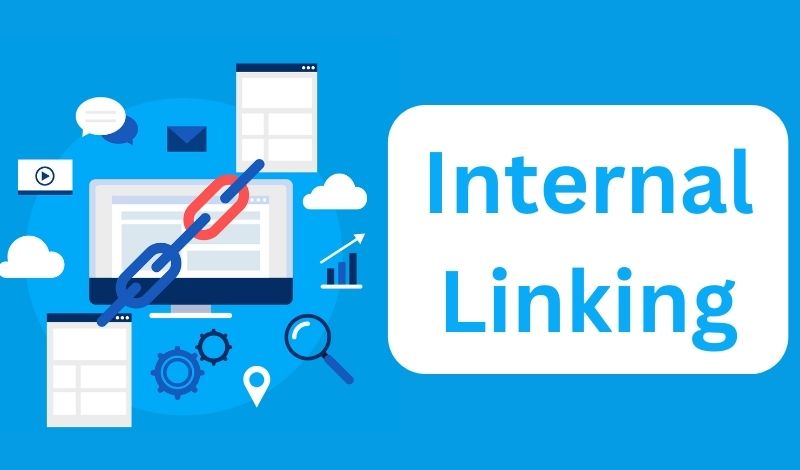
Build and improve internal links
Beyond the organizational challenges, the process of establishing internal links can be quite complex. You either need in-depth knowledge of the site to manually identify linking opportunities or rely on cumbersome scraping and crawling methods to uncover them.
At Ahrefs, we’ve streamlined this process for Enterprise SEO. Our Site Audit tool simplifies internal linking by analyzing your pages’ rankings and automatically recommending links from other relevant pages on your site. This makes internal linking more accessible, efficient, and scalable across large enterprise websites.
Create “vs” pages
Creating content that compares your business to competitors can be challenging in an enterprise setting due to potential legal restrictions and concerns. However, it’s still valuable to pursue such content, as it allows you to manage the conversation and present your strengths.
Instead of relying on large, potentially biased comparison tables, there are alternative approaches. For example, on our “vs” page, we focus on user feedback and highlight the unique features and high quality of our data, rather than directly criticizing competitors.
Create free tools
Developing free tools related to your product or data can be a powerful lead-generation strategy for your core offerings.
At Ahrefs, we’ve successfully employed this tactic, and some of our most visited pages come from these free tools. For example, we created a series of free writing tools, which we’re now beginning to monetize. This approach not only drives traffic but also helps establish your brand as a valuable resource, enhancing your Enterprise SEO efforts by offering tools that attract and engage users.
Create programmatic content
If you have the capability to generate high-quality pages programmatically using your data, it’s a powerful method for scaling your efforts quickly.
At Ahrefs, we’ve seen success with minimal effort by reusing components to create pages like “SEO for [X],” where [X] represents different types of businesses. Many of these pages are already performing well in search, but we plan to invest more effort and leverage additional data to further optimize them. This approach has been effective in boosting our Enterprise SEO strategy by efficiently scaling content creation while maintaining relevance and quality.
Create video content
Video content can be highly effective for businesses, and Sam Oh has been instrumental in driving substantial leads for Ahrefs.
Ahrefs’ YouTube channel has garnered over 500k subscribers with fewer than 300 videos, and many of these videos have amassed over 1 million views! This success showcases how Enterprise SEO can be enhanced through strategic video marketing, attracting a large audience and generating valuable traffic.
Enterprise Link Building Strategy & Tactics
At the enterprise level, much of the link-building process occurs outside of traditional SEO efforts. Large companies often engage in various activities that generate links naturally. These can include TV commercials, radio spots, the release of new content, public relations campaigns, social media strategies, paid ads, content syndication, corporate events, influencer partnerships, celebrity endorsements, affiliate marketing programs, and more. These activities, while not directly tied to Enterprise SEO, play a significant role in driving online visibility and backlinks.
Create linkable assets
In SEO, we refer to “linkable assets” or “link bait” as content specifically designed to attract backlinks. These assets can come in various formats, including:
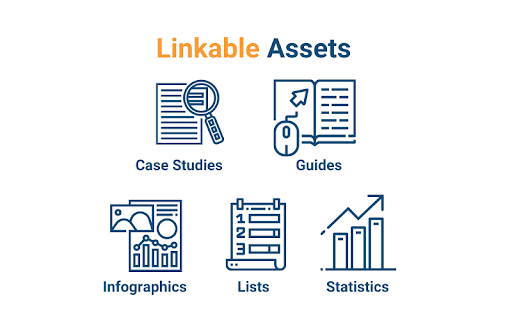
Create linkable assets
- Industry surveys
- Research reports and studies
- Online tools and calculators
- Awards and rankings
- How-to guides and tutorials
- Glossary entries and newly coined terms
- Infographics, GIFographics, and visual data maps
Additionally, you can leverage well-known employees or thought leaders within your industry by creating compelling quotes that encourage external linking.
Combine similar content to create a stronger page
Keyword cannibalization occurs when multiple pages on your site compete for the same keyword, leading to fluctuating rankings or simultaneous rankings for similar content. This can dilute the effectiveness of your SEO efforts. To address this, consider consolidating overlapping content into more comprehensive guides or pillar pages, which can boost your chances of ranking higher and attracting backlinks. Typically, this involves merging the content and setting up a redirect from one page to the other.
Promote your content
The greater the exposure your content receives, the higher the likelihood of naturally earning backlinks. Take advantage of the teams mentioned earlier to help amplify your content through social media or even paid advertising. Utilize influencer partnerships to expand your reach and engage your PR team for potential media placements.
However, remember that these teams have their own workloads and objectives. Be strategic in your requests and avoid overwhelming them with too many promotions. If you ask them to share everything, they may end up promoting nothing, so prioritize wisely for maximum impact in your Enterprise SEO efforts.
Go after unlinked brand mentions
Unlinked brand mentions refer to instances where your brand or anything closely associated with it is mentioned online but without a link directing back to your site.
For Enterprise SEO, these mentions provide a valuable opportunity to secure backlinks. Large companies often receive significant attention, and every mention is a potential backlink waiting to be claimed. Even if a mention doesn’t include a link right away, it’s worth reaching out and asking for one. You can use tools like Content Explorer to locate these mentions across the web, utilizing the filter for unlinked domains to narrow your search.
Additionally, you can explore unlinked mentions related to prominent employees, notable quotes, or key statistics from your research, all of which can serve as excellent link-building opportunities.
Recover links with link reclamation
Often, older URLs may have valuable backlinks from external sites. If these links are not redirected to the correct pages, they are essentially lost and will no longer benefit your content in search rankings.
The good news is, it’s not too late to fix this. By implementing redirects, you can recover lost link equity and improve your content’s visibility.
Here’s how to identify such opportunities for Enterprise SEO:
- Enter your domain in Site Explorer.
- Navigate to the “Best by Links” report.
- Apply a filter for “404 Not Found” HTTP responses to identify broken links.
By doing this, you can reclaim the value from those existing backlinks and ensure they continue to contribute to your SEO efforts.
Copy competitor links and strategies
There are several approaches to achieve this. A common suggestion for SEOs is to use a link intersect report, which we also offer. However, for larger sites, this method can produce a lot of noise and may not be as effective.
Build internal links
Internal linking has always been an effective strategy to boost page rankings.
However, in an enterprise setting, even securing these links can be challenging. Different teams may manage various sections of the site, which makes coordinating internal links a lengthy process, often requiring multiple meetings and continuous follow-ups.

Build internal links
Additionally, the internal linking process can be somewhat complicated. You may either need an in-depth understanding of the site to manually review pages for potential link opportunities or rely on a more labor-intensive method involving scraping and crawling to uncover those opportunities. In the context of Enterprise SEO, streamlining this process is crucial for efficiency.
Build links from other websites you own
If your organization manages multiple websites, it’s important to create relevant links between them where appropriate. While consolidating all content onto one site might be the ultimate goal, it’s often not practical or achievable in the short term. In such cases, linking between the sites can be a useful interim strategy.
Though this approach can be tricky and may stray into gray areas, as long as the links are natural and relevant to the content, it’s generally acceptable in the context of Enterprise SEO.
Buy other companies websites
I’ve previously discussed SEO strategies for mergers and acquisitions. When your company acquires another, you gain access to their content and backlinks. This provides valuable opportunities to merge content and direct links to more authoritative pages, boosting SEO performance.
Enterprise Technical SEO Strategy & Tactics
Enterprise websites often have intricate infrastructures and established legacy systems. Additionally, various teams may oversee different aspects of maintenance, making both the technical and political landscape challenging. As a result, certain pages or sections might have unresolved issues that remain neglected due to the high cost or complexity of fixing them, which is common in enterprise SEO environments.
Check indexing
In an enterprise SEO context, it’s likely that some pages are indexed when they shouldn’t be, while others that should be indexed are marked as noindex. Additionally, canonicalization can pose challenges, as it’s essential to ensure that the correct version of a page is the one being indexed. This is particularly important in large-scale enterprise websites where multiple versions of a page may exist.
Recover links with link reclamation
Often, older URLs on your enterprise site may have backlinks from other domains. If these are not redirected to the relevant current pages, the value of these links could be lost, impacting your overall SEO efforts.
However, it’s not too late to recover that lost link equity by implementing proper redirects, which can significantly boost your page rankings. To justify this effort, I usually estimate the value at around $400 per referring domain for business purposes.
Here’s how to identify these opportunities:
- Enter your domain into Site Explorer.
- Navigate to the “Best by links” report.
- Apply a filter for “404 not found” HTTP responses.
- Sort the results by “Referring domains” to identify the pages with the most backlinks.
Add internal links
Securing internal links can be challenging, especially in an enterprise setting. Often, different teams manage various sections of the website, making the internal linking process lengthy and requiring multiple meetings and follow-ups to ensure it’s implemented.
In addition to the organizational challenges, the internal linking process itself can be complex. You might either need a deep understanding of the site to manually browse through pages and identify linking opportunities, or use a more technical approach that involves scraping and crawling to pinpoint where links should be added.
Add schema markup
I highly recommend using schema markup, especially if it helps you gain visibility through search features. You can refer to our comprehensive guide on schema markup to find out which types are most beneficial for your site. Nowadays, there are some great tools available that can even recommend schema markup based on the content present on your page.
Fix Page Experience
While these factors might not have an immediate, dramatic impact on SEO, they significantly enhance the user experience, making them essential for any enterprise website.

Fix Page Experience
- Core Web Vitals: This measures the loading speed of your pages, which is critical for user satisfaction.
- HTTPS: Ensure your site is secure with HTTPS, as many sites, over 6%, still redirect from HTTPS to HTTP, which is a potential risk.
- Mobile-friendliness: Make sure your pages are optimized for mobile users, offering a smooth experience across devices.
- Interstitials: Avoid intrusive pop-ups or interstitials that cover a significant portion of the screen, as these can negatively impact usability, especially on mobile.
Focusing on these aspects not only boosts SEO but also contributes to a more seamless user journey on your enterprise site.
General website health / maintenance
While these issues may not directly influence SEO, they are crucial for maintaining a positive user experience on your site.
- Broken links: Identify and resolve them to avoid frustrating users.
- Redirect chains: Google can follow up to 10 redirects, but issues typically arise when there are more than 5. It’s best to monitor closely after 5 hops.
Additionally, sitemaps are essential. Automating their creation is the most efficient approach. If you have to create them manually, keep in mind they may not be updated regularly, which could hinder search engine crawling. Creating them from crawled pages ensures that search engines can access and index your content more effectively.
Fix Hreflang issues
Hreflang is essential for directing the correct page to the appropriate user in search results. For enterprise businesses, getting this right is particularly important, as poor pathing or frustrating user experiences can result in significant revenue loss.
Optimize crawl budget
For large sites with millions of pages or those that are updated frequently, crawl budget can become a key issue. If you notice that certain pages are not being crawled or updated as frequently as desired, it might be time to explore ways to accelerate the crawling process.
Optimize ecommerce pages
Ecommerce SEO is essential for any site that sells products online.
For enterprise websites, managing faceted navigation can present challenges. Fortunately, we have a comprehensive guide on optimizing faceted navigation to help you navigate these complexities.
Fix JavaScript SEO issues
The larger the site, the more probable it is that you’ll encounter multiple technology stacks, including JavaScript frameworks. These are newer than traditional CMS platforms and are often less familiar to many SEOs. To address this, we’ve put together a guide on JavaScript SEO that outlines common challenges, troubleshooting tips, and how Google handles the rendering process for such sites.
Migrate other websites
A website migration involves substantial changes to aspects such as the domain, URLs, hosting, platform, or design. Large enterprises often make these changes, which can lead to considerable disruptions. It’s crucial to establish clear standards to maintain consistency and reduce the negative effects of these modifications.
Keep traffic during mergers and acquisitions
Large enterprises frequently acquire other businesses, and during my time in enterprise SEO, it seemed like I was always involved in some kind of website consolidation project. There are numerous potential pitfalls and significant financial stakes involved. For more insights, take a look at our comprehensive guide on SEO for mergers and acquisitions.
Analyze log files
While managing log files is generally a task for developers, there are times when technical SEOs might be involved in this process. Log files can be costly to store and analyze, and they often contain sensitive information like IP addresses and personal data (PII), which is why many companies are hesitant to grant SEOs access. However, you may be able to request access for specific search bots, such as Googlebot and Bingbot.
A common way to use log files is to identify pages that require redirection, although you can also obtain this information through your analytics or the Crawl Stats report in Google Search Console.
Pull data from APIs
While working with APIs is typically a developer’s responsibility, many technical SEOs, especially in an Enterprise SEO setting, possess the necessary skills to assist in this area. Common applications include managing data storage, creating reports, and other tasks that require extracting or interacting with large sets of data.
Machine learning tasks
While not a necessity for every technical SEO, many professionals dive into machine learning initiatives. They often contribute to tasks like semantic analysis, automating redirects, and keyword clustering, among other data-driven SEO strategies.
Enterprise SEO Challenges
Whether you’re handling SEO in-house at an enterprise level or managing it for enterprise clients through an agency, understanding the intricacies of the corporate environment is essential. You might have a clear vision of what needs to be done to drive success, but executing those plans can be a challenge. Here’s what you need to focus on to thrive in Enterprise SEO:
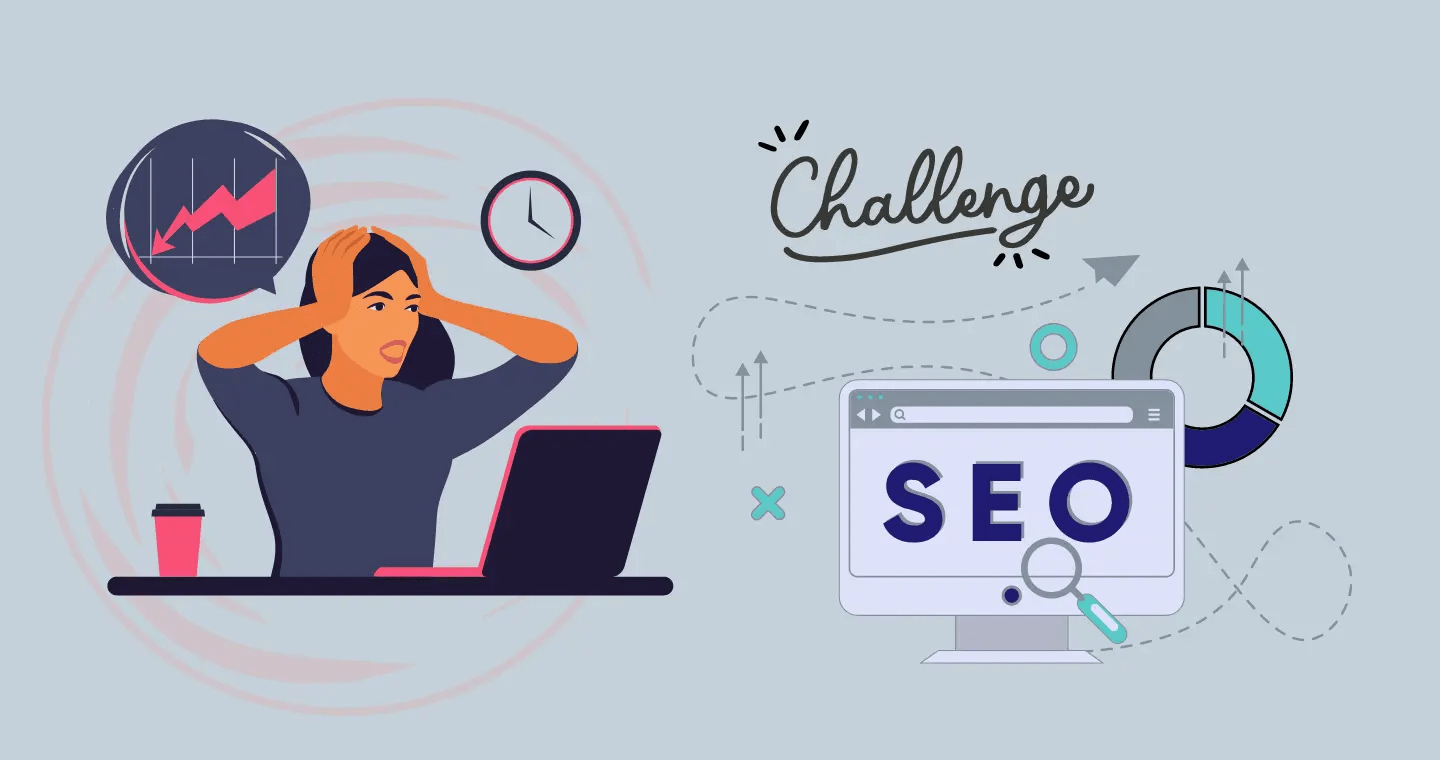
Enterprise SEO Challenges
- Securing support and buy-in for SEO initiatives
- Allocating resources and strategic planning for enterprise-scale projects
- Data analysis and reporting for actionable insights
- Structuring teams and workflows effectively
- Providing training and fostering SEO advocacy across departments
Getting buy-in for SEO
Incorporating simple yet impactful SEO statistics into your presentations and messaging can be a powerful way to highlight the value of Enterprise SEO. Here are some key points to consider:
- [X] monthly searches for [Y]. Most people aren’t aware that SEOs have access to search volume data. Sharing the number of monthly searches for a high-value term can spark significant interest and FOMO.
- 90.63% of pages don’t receive organic traffic from Google. (Source: Ahrefs) This statistic debunks the misconception that SEO isn’t essential and that a page will rank naturally.
- Top-ranking pages typically rank for nearly 1,000 other relevant keywords. (Source: Ahrefs) This demonstrates the importance of creating comprehensive content that not only targets one keyword but also ranks for many related terms, making a strong case for in-depth content strategies.
Enterprise resources and planning
Resources are always finite, no matter if you’re working within an enterprise team or as an agency handling enterprise clients. While budgets may be substantial, there’s a lot to tackle, and enterprise SEO teams often face resource limitations.
Progress will be slower, and chasing the latest SEO trends is unlikely. At the enterprise level, mastering the foundational SEO practices will often yield better results than trying to jump on every new fad. When it comes to enterprise SEO, sticking to the basics = tangible success.
Data/reporting
Reporting can be a significant drain on time at the enterprise level, but it’s an essential part of the process. If you can’t demonstrate the value of your work and its impact on the business, the importance of enterprise SEO may go unnoticed.
To gain buy-in, I typically focus on two key areas: tracking revenue and benchmarking against competitors. After all, money talks, and no one wants to fall behind their rivals.
You’ll likely be preparing reports in PowerPoint, dashboards, and possibly internal tools. The key is to tailor your reports to what matters most to your audience. While your SEO KPIs may be vital to your team, other departments might prioritize metrics like conversions and revenue.
Organization
Enterprise organizations are often intricate and multi-layered. There are typically numerous management levels and a considerable amount of complexity to navigate before you can move forward with certain projects. Simply identifying the right teams and key contacts can take time, and external teams often need to depend on internal staff for crucial insights and knowledge.
SEO training & evangelism
The more you collaborate with and empower others within the enterprise, the smoother your journey will be. Keep in mind, resources are always limited, so it’s crucial to train team members and identify champions who can advocate for and promote SEO across your organization. This will allow you to scale your impact effectively.

SEO training & evangelism
As mentioned earlier, activities like weekly meetings, office hours, networking events, and ‘lunch and learns’ are excellent for educating and building support. Additionally, you can offer team-specific training sessions, group workshops, or internal courses that focus on various SEO-related topics or tools.
Look for chances to integrate SEO into existing company events, workshops, or training sessions hosted by other departments. There are likely events geared towards marketing, development, analytics, or other areas where SEO can play a crucial role. You could also consider launching an internal email newsletter with updates related to both the company and SEO industry trends—this will provide value and showcase your expertise. Every opportunity to share your knowledge will enhance the success of your enterprise SEO program.
Enterprise SEO Tools
Here are some of the top enterprise SEO tools available:
| Product | Reviews | Pricing | Customers |
| Ahrefs | G2 4.5, Capterra 4.7, Gartner 4.5 | Starting at $14,990/year | 50,000+ |
| Conductor | G2 4.5, Capterra 4.4, Gartner N/A | No public pricing | 450+ |
| seoClarity | G2 4.5, Capterra 4.8, Gartner 4.5 | From $3,200/month (1 domain) | 3,500+ |
| Botify | G2 4.4, Capterra 4.2, Gartner N/A | No public pricing | 500+ |
| BrightEdge | G2 4.4, Capterra 4.2, Gartner 4.2 | No public pricing | 1,700+ |
With so many tools out there, each catering to different needs, how do you decide which one is the best fit for your enterprise SEO strategy?
While I naturally lean towards Ahrefs, we’re truly in a class of our own—44% of the S&P 500 choose us. Take a look at how we stack up against other enterprise SEO platforms in the market.
What To Look For in an Enterprise SEO Solution?
When choosing an enterprise SEO platform, it’s crucial to select a tool that aligns with your specific business objectives. For enterprise organizations, the right SEO platform should offer the following capabilities:
Scalable for Large, Complex Websites
Enterprise websites are significantly more intricate than those of smaller businesses. While small businesses might get by with basic tools like broken link checkers, enterprise SEO requires a more robust solution. Websites with thousands, or even tens of thousands of pages, present a far more challenging landscape for SEO.
To improve organic search performance on a large-scale site, you’ll need a comprehensive suite of tools. These should include technical SEO optimization, keyword research and tracking, international SEO capabilities, content analysis, search engine analytics, competitor benchmarking, internal linking management, backlink monitoring, and reporting. Managing all these tools separately is not only costly but also inefficient and difficult to manage, especially for large-scale enterprises.
A fully integrated, all-in-one platform is a more practical solution for enterprise SEO. Such platforms consolidate SEO processes, offer a centralized hub for all stakeholders, and provide a unified view of your web assets, making it easier to manage multiple domains, subdomains, and subdirectories.
Custom SEO Policies for Tailored Optimization
Every enterprise has its own goals and SEO needs, so why settle for generic SEO strategies? A good enterprise SEO platform should allow you to create custom SEO policies that cater specifically to your business’s requirements. This feature can automatically identify SEO-related elements like HTML, CSS, PDFs, and multimedia files across your site, eliminating the need for manual searches. Once issues are identified, you can make bulk changes across all relevant web pages, simplifying optimization.
Platforms like Siteimprove SEO offer both out-of-the-box and custom policies, which can identify issues such as:
- Internal linking gaps and opportunities
- Broken calls to action
- Misconfigured “no-index” HTML tags
- Non-semantic HTML
- Pages with broken links or “no-follow” internal links
- Meta descriptions over 160 characters
- Page titles exceeding 70 characters
- Empty or missing headers (H1, H2, H3, etc.)
By using these tools, you can quickly address any issues and run crawls to confirm improvements.
Competitor Analysis for SEO Strategy Development
One key reason to invest in enterprise SEO is to outpace your competitors in search engine rankings. Look for a platform that provides robust competitor analysis features, allowing you to track their performance and identify gaps in your own SEO strategy. This insight will help you develop a more competitive organic search approach and stay ahead of emerging threats in your industry.

Competitor Analysis for SEO Strategy Development
By comparing your site’s performance with that of your competitors, you can identify opportunities for improvement. For example, if competitors are ranking for keywords that your site isn’t, you can create more targeted, relevant content to close that gap.
Automated SEO Reporting and Performance Tracking
Enterprise SEO platforms should streamline the process of tracking and reporting your SEO efforts. Look for a solution that not only tracks key performance metrics like rankings but also ties them to broader business objectives such as revenue or market share growth.
Ideally, your platform should integrate with web analytics systems to provide a comprehensive view of your SEO performance. A good reporting system should also include progress-tracking metrics, like an SEO score, which can quickly demonstrate the impact of your efforts over time. This makes it easier to communicate your successes to management, even if they aren’t well-versed in SEO.
In summary, an ideal enterprise SEO platform is one that supports the complex needs of large, multi-faceted websites, offers customizable optimization tools, provides detailed competitor insights, and streamlines reporting and performance tracking—ultimately helping you scale and improve your organic search strategy.
What Makes Enterprise SEO Different From Traditional Strategies?
Additional Considerations for Enterprise-Level SEO Campaigns:
- Content Maintenance and Updates: Regularly ensuring that content remains relevant and up to date is crucial for maintaining strong SEO performance in large-scale enterprise environments. This requires continuous monitoring and updating, especially on extensive websites with multiple pages and frequent changes.
- Automation for Scalability and Customization: Implementing advanced automation tools can significantly enhance the efficiency of enterprise SEO. Look for solutions that offer scalability, advanced features, and high customization to streamline processes, such as reporting, auditing, and optimization.

What Makes Enterprise SEO Different From Traditional Strategies?
- Comprehensive Competitive Analysis: An effective enterprise SEO strategy demands a deeper, more detailed evaluation of both direct and indirect competitors. This analysis should go beyond just rankings, delving into their strategies, strengths, weaknesses, and market positioning to identify opportunities for improvement and growth.
- Regular SEO Audits by Specialized Teams: Large-scale websites require in-depth SEO audits conducted by specialists with the tools and expertise to handle the complexity. Unlike smaller companies, enterprise-level audits should focus on areas such as technical SEO, content evaluations, and market positioning, ensuring the site remains aligned with industry standards and search trends.
- Targeting High-Competition, High-Value Keywords: Enterprise SEO strategies should focus on more competitive and valuable keywords. This requires careful research and the ability to compete at scale, both in organic search and in terms of paid search campaigns.
- Dedicated SEO Specialists or Teams: Due to the complexity of enterprise SEO, having a dedicated SEO team or specialist is essential. This team should have expertise in analyzing data, tracking performance metrics, and adjusting strategies as necessary to maintain and improve organic search outcomes over time.
Key Differences in Enterprise SEO:
- Increased Complexity: Enterprise websites are far more complex than those of small businesses. This involves handling a larger volume of pages, more intricate website functionalities, extensive data sets to analyze, and a substantial amount of content that requires regular updating.
- Longer Time to See Results: With the size and complexity of enterprise websites, the impact of SEO efforts often takes more time to manifest. Unlike smaller sites, which may see quicker results, enterprise SEO strategies may take months or even years to show significant improvements, particularly in competitive markets.
- Strategic Approach Required: Enterprise SEO demands a more strategic approach, especially in keyword research, site architecture, on-page optimization, and content development. The scale and complexity of these projects require a higher level of attention to technical SEO challenges, as well as careful management of the sheer volume of content and pages.
In conclusion, enterprise SEO requires careful planning, advanced tools, and specialized teams to address the unique challenges that come with large-scale websites. From content maintenance to in-depth audits and competitive analysis, a more strategic and long-term approach is essential for achieving success.
Best Practices for Enterprise SEO
Effective SEO for enterprise businesses starts with a well-defined and tailored strategy. It must be aligned with the specific goals and needs of your company or agency, and it’s essential to continuously review and refine it as necessary to ensure it remains relevant and impactful.
SEO Content Creation for Enterprise Companies
For successful enterprise SEO, content creation is at the heart of the strategy — and it requires a robust approach. Here are key best practices to follow:

SEO Content Creation for Enterprise Companies
- Know Your Audience: Craft content tailored to the needs and challenges of your target audience. Developing customer personas can help guide this process effectively.
- Consistent Posting: Regularly update your content to address user intent — the reason behind a user’s search query. Create actionable and valuable articles that your audience can use in their daily lives.
- Cover the Entire Funnel: Make sure your content speaks to users at all stages of the buying journey — from awareness to decision-making.
- Optimize Underperforming Content: Identify content that isn’t driving results and enhance it to boost user engagement, organic traffic, and search rankings.
- Update and Repurpose: Refresh outdated content, leverage content syndication, and make sure to optimize existing materials with expert insights and competitor analysis to stay competitive.
- Expand Globally: If applicable, translate successful content for international markets to enhance your global SEO reach.
- Quality Over Quantity: Focus on producing in-depth, high-quality content that offers real value and actionable insights to your readers.
- Measure and Adjust: Track performance metrics regularly and use data to adjust your content strategy to maximize SEO impact.
- Monitor Competitors: Continuously analyze your competitors’ strategies. Are they shifting focus, and how is their new approach performing?
- Consider Expert Help: If managing large-scale content optimization feels overwhelming, partnering with an SEO agency that specializes in enterprise SEO can provide the expertise and support you need.
Link Building for Enterprise Companies
When it comes to link-building for enterprise SEO, following proven strategies is crucial to achieving success. Here are some key practices to keep in mind:

Link Building for Enterprise Companies
- Leverage Content Explorer Tools: Utilize tools like Content Explorer on Ahrefs to identify high-performing content in your niche that has garnered a substantial number of backlinks. This can help you discover potential link-building prospects, find linkable assets, or even identify opportunities for guest posts and link requests.
- Analyze Competitor Backlinks: Study the backlink profiles of your competitors to uncover new link-building opportunities. This analysis can reveal where your competitors are succeeding and where you might be able to replicate their strategies.
- Tap into Review Platforms and Aggregators: While they may come with a high price tag, review platforms and aggregators can offer valuable visibility and credibility. These platforms can be powerful sources for building quality links.
- Monitor for Penalties: Even large-scale enterprise websites can face penalties from user-generated content issues, such as copyright violations or spam. Regularly monitor your backlinks to ensure you’re not at risk of penalties that could hurt your SEO performance.
- Build Relationships with Industry Authorities: Focus on establishing relationships with authoritative websites, industry influencers, and thought leaders in your field. These connections can help you secure valuable backlinks and enhance your SEO profile.
- Create Valuable, Shareable Content: Generate high-quality, useful content that naturally attracts backlinks. The more valuable and informative your content, the more likely other websites will link back to it.
- Regular Backlink Audits: Continuously audit your backlinks to ensure that the links you have are relevant, high-quality, and beneficial for your SEO strategy. Remove or disavow any low-quality or harmful links that may be affecting your site’s authority.
Technical SEO for Enterprise Companies
An effective enterprise SEO strategy is incomplete without paying attention to technical SEO, which ensures your website operates efficiently. Here are some essential steps to follow:
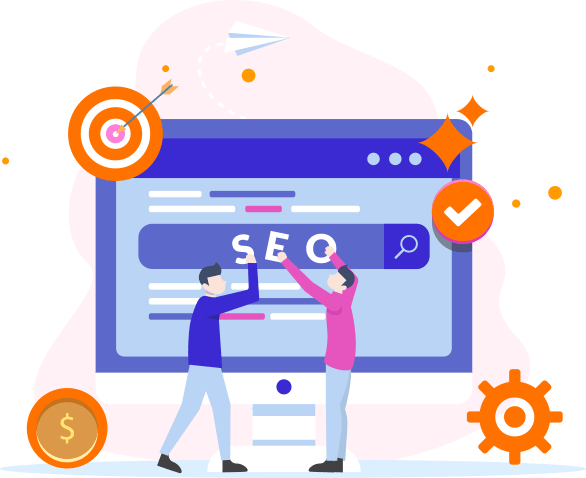
Technical SEO for Enterprise Companies
- Leverage Tools for Technical Audits: Use tools like Ahrefs’ site audit function to uncover and prioritize any technical SEO challenges. This will help you identify critical issues that may impact your site’s performance.
- Focus on Core Areas: Concentrate on crucial elements like ensuring proper indexation, fixing broken links, and optimizing page load speed. Additionally, make use of schema markup, automate sitemap generation, and conduct log file analysis for deeper insights.
- Organize Website Structure: Ensure your website has a clear, logical structure that makes it easy for search engine crawlers to navigate and index. A well-structured site ensures better SEO performance.
- Monitor and Resolve Crawl Errors: Regularly check for crawl errors and broken links. Implement 301 redirects for any removed pages to preserve link equity and maintain a seamless user experience across the site.
How Agencies and Professionals Can Scale Up Their Enterprise SEO Strategy
Delivering SEO services at an enterprise level can be complex, no matter how seasoned your agency is. Enterprise professionals might also face challenges when attempting to cater to the specific needs of large-scale clients.
However, overcoming these challenges is entirely feasible. Here are some strategies to help scale your enterprise SEO efforts when working with larger clients:
Understand the business inside and out
Before you can effectively scale your enterprise SEO approach, it’s crucial to have a solid grasp of the business at hand:
- What are the primary objectives of the business?
- Who is the target audience you’re trying to reach?
- Who are the key competitors in the industry?
By answering these fundamental questions with confidence, you’ll be better positioned to create a tailored and impactful enterprise SEO strategy for your client.
Keep up with the latest trends & best practices
A crucial aspect of scaling your enterprise SEO is staying updated with the latest trends and best practices in organic search. This means keeping track of algorithm updates, understanding evolving consumer behaviors, and embracing emerging technologies such as generative AI.
By remaining informed about industry shifts and innovations, you ensure that your campaigns stay competitive and at the forefront of the digital landscape.
Create customized solutions
A critical factor in successfully scaling enterprise SEO is developing tailored solutions for each client.
For example, some clients may see significant gains by optimizing their current content. In contrast, others may require a complete content overhaul, with a focus on fresh strategies and new keyword opportunities to drive better results.
Get specialists on board
If you haven’t already, now is a great time to consider partnering with an expert or agency that specializes in enterprise SEO consulting.
Optimizing an enterprise website involves far more than just a few pages. It encompasses managing hundreds or even thousands of pages, requiring constant monitoring, reporting, and updates. To meet these challenges, you’ll need support from SEO specialists who can help with in-depth keyword research and comprehensive website optimization.
Bringing the right experts on board ensures a smooth and efficient execution of your SEO strategy. If you’re looking for assistance in this area, my team at NP Digital is here to help you develop and implement a successful enterprise SEO strategy.
Invest in tools
Managing an enterprise SEO strategy is a significant undertaking that often requires a team effort, which means you’ll need to invest in the right tools.
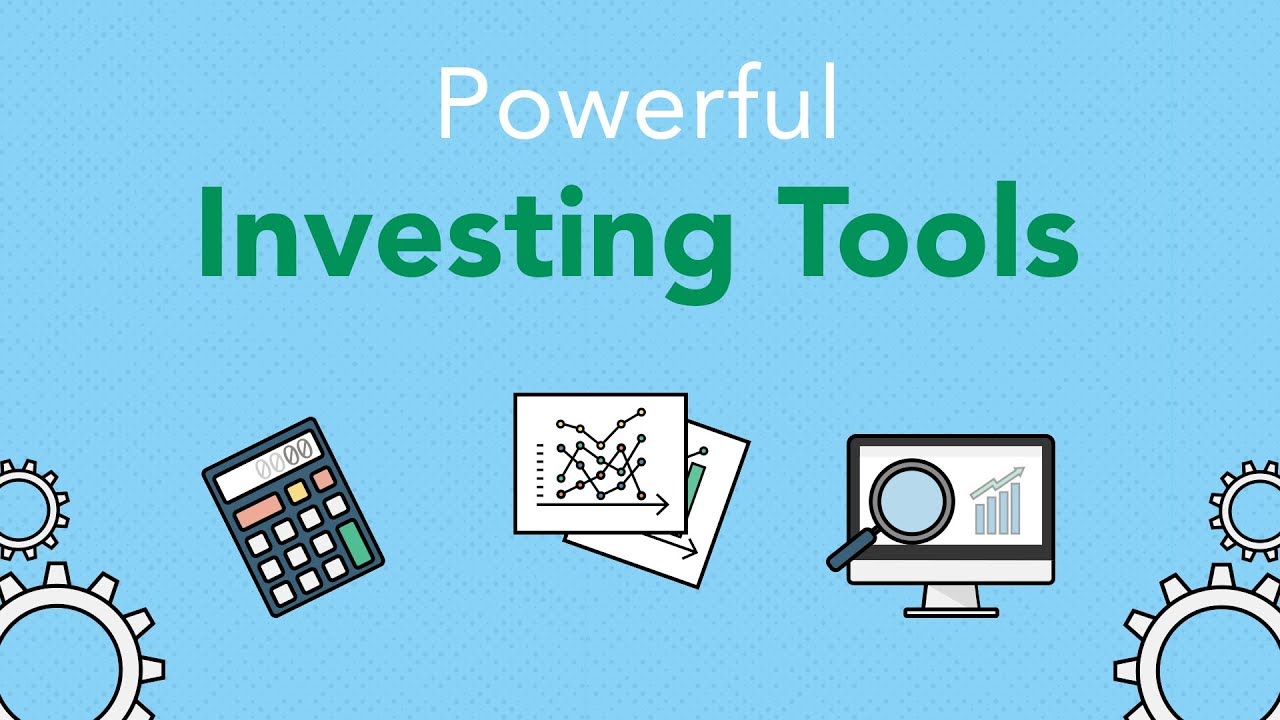
Invest in tools
Tools like Ahrefs, Moz, and Semrush are ideal for enterprise-level SEO, offering comprehensive features that cater to both agencies and large businesses. However, if these tools are too expensive for your budget, Ubersuggest is an affordable alternative, with its enterprise-level plan available for $99 per month. Later in this article, I’ll explore these tools in more detail to help you make an informed decision.
Assess your experience levels
Enterprise SEO may not be the right fit for small-scale businesses. As discussed, this strategy is best suited for organizations with extensive content—think thousands of pages—and those operating on a global scale.
Similarly, emerging agencies with limited resources should be cautious about offering enterprise SEO services. They may lack the necessary budget, personnel, and technical know-how to deliver successful outcomes.
Industry expertise is also crucial when managing enterprise-level SEO, especially for large-scale e-commerce sites and other businesses that require complex, high-volume optimization efforts.
Establish Clear Communication Channels
Effective communication is crucial when managing enterprise SEO due to the complexity and scale of the projects. Keeping clear and organized communication channels with clients helps ensure alignment and allows for quick resolution of any issues.
Consider setting up regular check-ins, such as weekly or bi-weekly meetings, to discuss performance, review recommendations, and gather feedback from your clients. Additionally, it’s important to have consistent communication with your internal team of specialists to keep everyone informed.
Project management tools like Trello and Asana, or communication platforms such as Slack and Microsoft Teams, can facilitate real-time collaboration and ensure that all team members are on the same page.
Regularly Monitor and Report Performance
A crucial element of any enterprise SEO campaign is establishing clear, measurable goals. For instance, you might aim to boost organic traffic by 20% or achieve 100 conversions within a six-month period.
Consistently tracking campaign performance is essential to staying on course and identifying opportunities for optimization. By analyzing data such as traffic levels, click-through rates, keyword rankings, conversion rates, and other key metrics, you can assess the effectiveness of your strategy and make necessary adjustments.
Enterprise SEO – Frequently Asked Questions

Enterprise SEO – Frequently Asked Questions
What are the benefits of enterprise SEO?
Enterprise SEO offers several advantages for large businesses, including improved search visibility, increased organic traffic, and enhanced brand authority. It allows businesses to optimize large-scale websites, ensuring better indexing and crawling by search engines. Additionally, it drives long-term results, enhancing the user experience, boosting conversion rates, and establishing a competitive edge in the market.
How do I know if I need Enterprise SEO?
If your business operates on a large scale, with thousands of pages and a global or national reach, you may need enterprise SEO. Other signs include managing complex websites with multiple departments, product lines, or regional pages, as well as having limited time and resources to manage SEO across multiple channels. If your SEO efforts are falling short, or if you are experiencing stagnation in organic traffic, it’s a strong indicator that enterprise SEO could benefit you.
How do you develop enterprise SEO strategies?
Developing enterprise SEO strategies requires in-depth research, including keyword analysis, competitive audits, and an evaluation of the existing site architecture. You must optimize technical elements such as site speed, mobile responsiveness, and structured data. Content must be tailored for both users and search engines, covering all stages of the buyer’s journey. Finally, building strong backlink profiles and consistently measuring performance through data analysis will guide ongoing optimization.
How long does it usually take to notice the results of enterprise SEO initiatives?
The results from enterprise SEO efforts can take time due to the complexity and scale of large websites. It typically takes several months (3-6 months or longer) to notice significant improvements in organic traffic, rankings, and conversions. For highly competitive industries or businesses with a vast online presence, it may take even longer. Continuous monitoring and optimization are key to ensuring long-term success.
Conclusion
In today’s highly competitive digital landscape, achieving visibility and driving traffic to your enterprise-level website requires more than just basic SEO tactics. This is where Enterprise SEO comes into play—offering tailored strategies designed to tackle the complexities of large-scale, high-traffic websites. At OctopusWriters, we specialize in crafting comprehensive Enterprise SEO strategies that address the unique needs of your business. Whether you’re managing thousands of pages or competing in highly saturated markets, an effective Enterprise SEO strategy is essential for improving search engine rankings, boosting organic traffic, and enhancing your brand’s online presence. Let’s explore why Enterprise SEO is so critical and how OctopusWriters can help you achieve your business goals through expert optimization.

